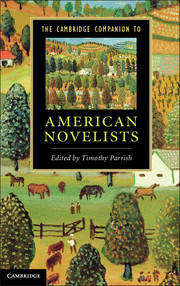Book contents
- Frontmatter
- Contents
- Contributors
- Introduction
- 1 James Fenimore Cooper
- 2 Nathaniel Hawthorne
- 3 Herman Melville
- 4 Harriet Beecher Stowe
- 5 Mark Twain
- 6 Henry James
- 7 Edith Wharton
- 8 Theodore Dreiser
- 9 Willa Cather
- 10 F. Scott Fitzgerald
- 11 Ernest Hemingway
- 12 William Faulkner
- 13 Henry Roth
- 14 Djuna Barnes
- 15 Zora Neale Hurston
- 16 Richard Wright
- 17 Raymond Chandler
- 18 Ralph Ellison
- 19 J. D. Salinger
- 20 Patricia Highsmith
- 21 Vladimir Nabokov
- 22 Jack Kerouac
- 23 Saul Bellow
- 24 Kurt Vonnegut
- 25 John Updike
- 26 Thomas Pynchon
- 27 Toni Morrison
- 28 Philip Roth
- 29 Don DeLillo
- 30 Cormac McCarthy
- Guide to Further Reading
- Index
- References
26 - Thomas Pynchon
Published online by Cambridge University Press: 05 December 2012
- Frontmatter
- Contents
- Contributors
- Introduction
- 1 James Fenimore Cooper
- 2 Nathaniel Hawthorne
- 3 Herman Melville
- 4 Harriet Beecher Stowe
- 5 Mark Twain
- 6 Henry James
- 7 Edith Wharton
- 8 Theodore Dreiser
- 9 Willa Cather
- 10 F. Scott Fitzgerald
- 11 Ernest Hemingway
- 12 William Faulkner
- 13 Henry Roth
- 14 Djuna Barnes
- 15 Zora Neale Hurston
- 16 Richard Wright
- 17 Raymond Chandler
- 18 Ralph Ellison
- 19 J. D. Salinger
- 20 Patricia Highsmith
- 21 Vladimir Nabokov
- 22 Jack Kerouac
- 23 Saul Bellow
- 24 Kurt Vonnegut
- 25 John Updike
- 26 Thomas Pynchon
- 27 Toni Morrison
- 28 Philip Roth
- 29 Don DeLillo
- 30 Cormac McCarthy
- Guide to Further Reading
- Index
- References
Summary
Thomas Pynchon (1937–) is a leading member of those American novelists who began their careers in the 1960s whose subsequent output not only garnered major awards but has gained recognition as making a unique commentary on recent American culture and history. In his introduction to his collection of short fiction, Slow Learner (1984), Pynchon explains how the writings of the Beats helped him to break free from the literary decorum stifling expression in late-1950s America and to create fiction containing a range of different voices, however profane. From the same period, the decade following Hiroshima, Pynchon dates “one of the most remarkable flowerings of literary talent … in our history,” namely, that of science fiction. Pynchon himself has incorporated a number of science fiction tropes in his fiction: moon rockets in Gravity’s Rainbow, extraterrestrials in Vineland, a hollow earth voyage in Against the Day, among other examples. In a 2006 letter in support of Ian McEwan, who had been accused of plagiarism in his novel Atonement, Pynchon found common cause with “most of us who write historical fiction.” A diversity of voices and a concern to investigate different historical moments have been two of the main characteristics of Pynchon’s fiction together with a skill at moving the reader to and fro between high seriousness and low farce.
Pynchon’s first novel, V. (1963), alternates episodes from 1898 up to the 1930s with sections taking place in late 1955 and 1956. The latter approach the Suez crisis but cut off just before it breaks. Similarly the first episode in the historical sequence, originally published as a stand-alone story set in Egypt, “Under the Rose,” is set on the eve of the Fashoda crisis of 1898, which almost brought France and Britain to war over rival imperial claims in Africa. This story establishes one of Pynchon’s main historical themes – empire – whose ideology he was challenging when he incorporated the story into V. by multiplying perspectives to include those of the local functionaries blanked out in the guidebooks of the period that were his source for locations.
- Type
- Chapter
- Information
- The Cambridge Companion to American Novelists , pp. 260 - 269Publisher: Cambridge University PressPrint publication year: 2012



